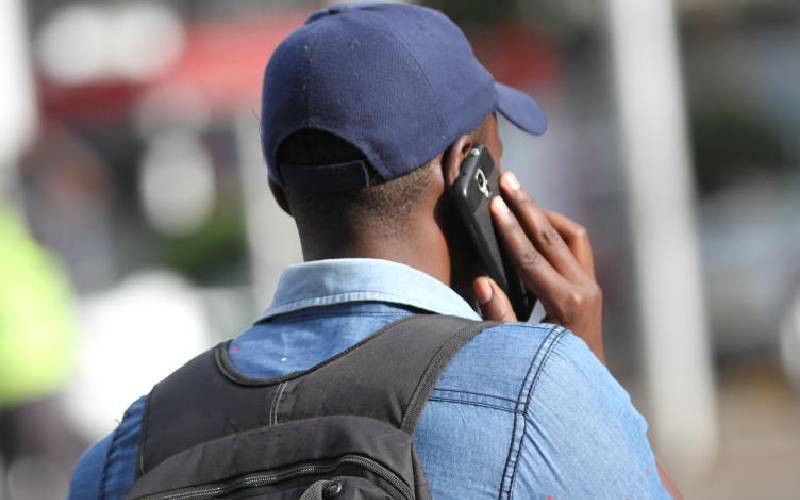Kenyans caught out in SIM card shut off

Thousands of Kenyans yesterday woke up to the shocking reality that their mobile phone SIM cards had been deactivated following the expiry of the October 15 deadline for line owners to register them afresh.
Safaricom, Airtel Kenya and Telkom deactivated the lines yesterday after the Communications Authority of Kenya (CA) set the October 15 date for mandatory SIM card re-registration in the quest to identify genuine line owners.
The move is among a raft of measures that CA unveiled before the August election, requiring all Kenyans with phones to register them afresh. The regulator also advised parents and guardians to register the lines used by minors under their care.
Registration of phone lines is among measures expected to fight crime by making it easy to trace, for instance, people who last communicated with murder or abduction victims.
The move is also meant to fight serious crimes like terrorism by preventing criminals from using stolen identity cards to register telephone lines.
While defending the directive in April, CA Director-General Ezra Chiloba said: “The requirement to update subscriber registration details is being done primarily to protect consumers of telecommunication services—who is you and me. Incidences of SIM-boxing, financial fraud, kidnapping, terrorism and related crimes prevail in situations of compromised SIM card registration processes. How can we win the war against such crimes if we cannot participate by ensuring that we have updated records?”
Photographs
One of the requirements was that a customer had to present himself or herself physically for a photograph to be taken and for their records to be verified against documents like identity cards. The move was meant to ensure that no one could register a line with another person’s name or identity details.
The move caused uproar in April over fears that it could have been linked to identification of voters, raising fears that this could compromise the outcome of the elections. This prompted CA to give October 15 as the new deadline. Among those who found themselves on the wrong side of the directive when the deadline expired were politicians and lawyers.
Taking to their twitter account, Makueni Governor Mutula Kilonzo Jr, Nandi Senator Samson Cherargei, Mogotio MP Reuben Kiborek, Gilgil MP Martha Wangari, lawyers Ahmednasir Abdullahi and Charles Kanjama, and former Wajir Woman Rep Fatuma Gedi accused Safaricom of switching off their lines without prior notification.
Safaricom routinely sent reminders to its customers on its app asking them to regularise their line registration details themselves or by seeking assistance from its agents.
Yesterday, Ahmednasir accused Safaricom of switching off his line irregularly despite being a loyal customer for over two decades. Following the move, he threatened to switch to one of the telco’s competitors and never use his Safaricom line again.
“They unceremoniously switched off my line this Sunday… tomorrow I will move to one of the competitors and will NEVER use their service again,” he said.
Hours after his protest, he tweeted again that Safaricom had restored his line. “That was the sensible thing to do,” he said.
Airtel Kenya, Safaricom’s main competitor, while replying to one of its customers, took advantage of the spat to invite those who felt discontented to join its network.
Telkom Kenya was not left behind, highlighting one of its customers’ feedback that the network offered the best deals on data.
“Thank you for your feedback. Keep moving with us,” the third largest telco said in a tweet.
Suffered fate
Kilonzo Jnr, while responding to Ahmednassir’s tweet, also lamented that he had suffered the same fate.
“It took a while to figure out that my line had been barred,” he said.
Cherargei also tweeted that despite using Safaricom for the last 15 years, his line had been switched off. He said there was need for the country to have other vibrant competitors to end Safaricom’s domination of the mobile phone market.
“Competition Authority of Kenya (CAK) over to you!” he tweeted.
Lawyer Kanjama, who won the Law Society of Kenya Nairobi chairmanship contest in 2018, said he will be filing a suit against Safaricom for breach of contract and violation of customers’ rights.
However, Narok Senator Ledama ole Kina told Ahmednassir and Cherargei to stop complaining as they had all the time to register their lines like other Kenyans.
“Why are you guys complaining about @Safaricom_Care. You know the law, why can’t you just follow it like all other Kenyans? are too busy to queue and register your line?” he tweeted.
On Saturday, Safaricom had asked its subscribers to register their lines to avoid being disconnected. In a series of tweets, the telco advised its customers to either visit their shops or update their lines.
“D-DAY is here! Update your SIM registration details on https://bit.ly/kyc-upload, my Safaricom App or any M-PESA agent near you to avoid disconnection. #SimRegistration,” the telco said in one of its tweets.
Two weeks ago, Safaricom subscribers who were yet to update their details with the operator complained that they had been barred from initiating calls. However, other services such as M-Pesa—the money transfer service—and receiving of calls were accessible.
“People should update their details per the directive from the Communications Authority,” said one of the customer care agents who was, however, not authorised to speak on behalf of the telco.
Sim card registration
The switching off of lines came after CA clarified on Friday that SIM card registration is a continuous process despite Saturday’s deadline.
CA had initially set April 14 as the deadline for registration but later extended it to Saturday, to give more time for network operators and subscribers to comply.
The regulator was enforcing the Kenya Information and Communications (Registration of SIM cards) Regulations, 2015, which require all mobile operators to collect specific details about their subscribers during registration and update any changes made thereafter to those details.
By April, Safaricom and Airtel had verified 65 per cent (24 million people) and 52 per cent of their subscribers, respectively. CA’s quarter one data sector report between July to September 2021 shows the number of active SIM cards stood at 64.9 million. This is because some subscribers have more than one line.
In June, CA said more than 124,000 SIM cards had been deactivated to curb illegally registered after it emerged that some 14 million lines across all networks were yet to be registered. The switch-off came in the wake of an audit that unearthed loopholes in adherence to SIM card registration laws.
Using an unregistered SIM card can land one in jail for six months or be fined Sh100,000 or both if convicted.









